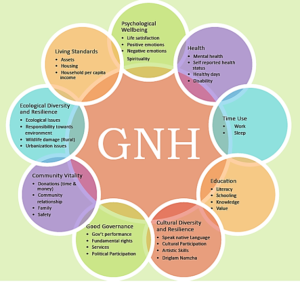Gross National Happiness (GNH) is a measurement of the collective happiness in a nation. The term was coined in 1972 by Bhutan’s fourth Dragon King, Jigme Singye Wangchuck. The GNH concept has inspired a modern political happiness movement. Through the contribution of several western and eastern scholars, economists and politicians, the concept evolved into a socioeconomic development model. The United Nations passed Resolution 65/309, that was adopted unanimously by the General Assembly in July 2011, placing “happiness” on the global development agenda.
MEASURE WHAT MATTERS
Studies show that our behavior is affected by our attention. The measures we choose – what draws our attention – will drive the things we do and the decisions we make. Measuring what matters helps us make decisions that are truly aligned with our values.
When we measure what matters – things change!
 GNH 9 Domains of Measurement:
GNH 9 Domains of Measurement:
1. Psychological Wellbeing
2. Material Wellbeing/Standard of Living
3. Good Governance
4. Health
5. Education
6. Community Vitality
7. Cultural Diversity and Resilience
8. Balanced Time Use
9. Ecological Diversity
What we focus our attention on is our choice – and it matters greatly both in this very moment and for our future!
More Resources
Visit the following sites to learn more about the origins of Gross Nation Happiness, the nine domains and current work internationally.
